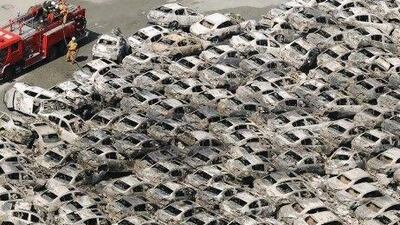The multiple crises Japan has suffered this year - the earthquake, a devastating tsunami and the world's most serious nuclear power accident for decades - are expected to mean the country's economy will show zero per cent growth this year.
Economic troubles: Storm clouds gather across the world.
Last Updated: June 17, 2011
Billions wiped off global stocks Trading screens across the world flash red as sharp sell-offs take place everywhere. Read article
In the Gulf UAE debt sales set to boost the Middle East Read article
In Europe Spectre of Greek default looms Read article
In India Warning of unrest as trouble grows Read article
In the US Politicians in economic theatre of battle Read article
In China Curbing inflation is a balancing act Read article
Kaoru Yosano, the country's economic and fiscal policy minister, made the prediction earlier this week as the former powerhouse of Asia continues the long and slow road back to normality.
In the first quarter of this year, which included the March 11 earthquake and tsunami disaster, there was a 3.5 per cent annualised contraction in the economy.
The disaster, with an official toll of 15,000 dead and 8,000 missing, had a devastating effect on manufacturing, with plants within the country and overseas forced to shut down, particularly in the automotive industry as parts ran short.
Toyota had to reduce shifts in factories as far afield as England. The company, expected to lose its crown as the world's largest car maker, warned this month its profits would tumble 31 per cent as a result of the tsunami and earthquake, which as well as affecting production also severely dented domestic sales. Globally sales are likely to fall 1 per cent.
Japanese manufacturers are still heavily pessimistic about the outlook for the third quarter of this year, with surveys finding sentiment has deteriorated significantly from three months ago, although reports indicate households and businesses are more upbeat. As rebuilding efforts get into gear, and with exports predicted to grow, an upturn is expected in the second half of this year.
The Bank of Japan (BoJ) doubled its asset-buying programme to ¥10 trillion (Dh454.87 billion) following the disaster and made a record cash injection into the economy. This month it announced an additional ¥500bn assistance scheme for companies lacking property capital, Bloomberg News reported. The bank additionally kept its key interest rate at just 0.1 per cent.
Economists warned the modest additional assistance programme would have little effect on increasing lending or on economic growth.


